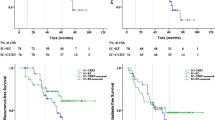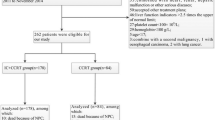Abstract
Background
Induction chemotherapy (IC) followed by concurrent chemo-radiotherapy (CCRT) is the current standard of care for locoregionally advanced nasopharyngeal carcinoma (LA-NPC) patients. However, there is still no consensus on the optimum number of IC cycles. In this study, we aimed to assess the efficacy and toxicities of two or more cycles of IC for LA-NPC patients.
Methods
Data of LA-NPC patients consecutively treated with IC followed by concurrent chemo-radiotherapy (CCRT) in our institute from 2017 to 2022 were retrospectively retrieved and analyzed. Survival outcomes of patients who received two IC cycles were compared with those who received more than two IC cycles. Univariate and multivariate Cox regression analysis were then performed to determine factors that could be independent predictors of survival. Chi-square test and Fisher’s exact test were used to compare treatment associated acute toxicities between the two groups.
Results
A total of 125 patients were recruited in this study. There were 89 patients who received 2 cycles (IC = 2) of IC and 36 received more than 2 cycles (IC > 2) of IC. The median follow-up time was 26 months [IQR 16–38]. The 3-year overall survival rate was not statistically significant between the two groups (95.50% vs. 86.11%, P = 0.501). Similarly, loco-regional recurrence free survival and progression free survival were not significant (97.75% vs. 97.22%, P = 0.694; and 88.76% vs. 83.33%, P = 0.129), but distant metastasis free survival was significant (88.76% vs. 86.11%, P = 0.049). Multivariate Cox regression analysis showed that IC regimen was an independent prognostic factor.
Conclusions
Two cycles of IC is effective and more than two does not add any additional benefit to the survival outcomes of LA-NPC patients.

Similar content being viewed by others
Availability of data and materials
Not applicable.
References
Chen Y-P, Chan ATC, Le Q-T, Blanchard P, Sun Y, Ma J (2019) Nasopharyngeal carcinoma. The Lancet 394(10192):64–80. https://doi.org/10.1016/S0140-6736(19)30956-0
Sung H et al (2021) Global Cancer Statistics 2020: GLOBOCAN Estimates of Incidence and Mortality Worldwide for 36 Cancers in 185 Countries. CA Cancer J Clin 71(3):209–249. https://doi.org/10.3322/caac.21660
Khor TH, Tan BC, Chua EJ, Chia KB (1978) Distant metastases in nasopharyngeal carcinoma. Clin Radiol 29(1):27–30. https://doi.org/10.1016/S0009-9260(78)80160-3
Al-Sarraf M et al (1998) Chemoradiotherapy versus radiotherapy in patients with advanced nasopharyngeal cancer: phase III randomized Intergroup study 0099. J Clin Oncol 16(4):1310–1317. https://doi.org/10.1200/JCO.1998.16.4.1310
Chan ATC et al (2002) Concurrent chemotherapy-radiotherapy compared with radiotherapy alone in locoregionally advanced nasopharyngeal carcinoma: progression-free survival analysis of a phase III randomized trial. J Clin Oncol 20(8):2038–2044. https://doi.org/10.1200/JCO.2002.08.149
Lin J-C, Jan J-S, Hsu C-Y, Liang W-M, Jiang R-S, Wang W-Y (2003) Phase III study of concurrent chemoradiotherapy versus radiotherapy alone for advanced nasopharyngeal carcinoma: positive effect on overall and progression-free survival. J Clin Oncol 21(4):631–637. https://doi.org/10.1200/JCO.2003.06.158
Chen L et al (2012) Concurrent chemoradiotherapy plus adjuvant chemotherapy versus concurrent chemoradiotherapy alone in patients with locoregionally advanced nasopharyngeal carcinoma: a phase 3 multicentre randomised controlled trial. Lancet Oncol 13(2):163–171. https://doi.org/10.1016/S1470-2045(11)70320-5
Sun Y et al (2016) Induction chemotherapy plus concurrent chemoradiotherapy versus concurrent chemoradiotherapy alone in locoregionally advanced nasopharyngeal carcinoma: a phase 3, multicentre, randomised controlled trial. Lancet Oncol 17(11):1509–1520. https://doi.org/10.1016/S1470-2045(16)30410-7
NCCN, “Nasopharyngeal Cancer.” 2019. [Online]. https://www.nccn.org/patients/guidelines/content/PDF/hn-nasopharynx-patient.pdf. Accessed 10 Jan 2022
Zhang Y et al (2019) Gemcitabine and cisplatin induction chemotherapy in nasopharyngeal carcinoma. N Engl J Med 381(12):1124–1135. https://doi.org/10.1056/NEJMoa1905287
Bae WK et al (2010) Phase II study of docetaxel, cisplatin, and 5-FU induction chemotherapy followed by chemoradiotherapy in locoregionally advanced nasopharyngeal cancer. Cancer Chemother Pharmacol 65(3):589–595. https://doi.org/10.1007/s00280-009-1152-0
Du C, Ying H, Zhou J, Hu C, Zhang Y (2013) Experience with combination of docetaxel, cisplatin plus 5-fluorouracil chemotherapy, and intensity-modulated radiotherapy for locoregionally advanced nasopharyngeal carcinoma. Int J Clin Oncol 18(3):464–471. https://doi.org/10.1007/s10147-012-0403-y
Kong L et al (2013) Neoadjuvant chemotherapy followed by concurrent chemoradiation for locoregionally advanced nasopharyngeal carcinoma: interim results from 2 prospective phase 2 clinical trials. Cancer 119(23):4111–4118. https://doi.org/10.1002/cncr.28324
He Y et al (2020) Optimizing number of cycles of induction chemotherapy for patients with nasopharyngeal carcinoma: Retrospective survival analysis. Head Neck 42(8):2067–2076. https://doi.org/10.1002/hed.26141
Peng H et al (2016) Optimize the cycle of neoadjuvant chemotherapy for locoregionally advanced nasopharyngeal carcinoma treated with intensity-modulated radiotherapy: a propensity score matching analysis. Oral Oncol 62:78–84. https://doi.org/10.1016/j.oraloncology.2016.10.014
Jiang Y et al (2022) Optimize the number of cycles of induction chemotherapy for locoregionally advanced nasopharyngeal carcinoma: a propensity score matching analysis. J Cancer 13(2):426–435. https://doi.org/10.7150/jca.65315
Jiromaru R, Nakagawa T, Yasumatsu R (2022) Advanced nasopharyngeal carcinoma: current and emerging treatment options. CMAR 14:2681–2689. https://doi.org/10.2147/CMAR.S341472
Chan ATC et al (2005) Overall survival after concurrent cisplatin-radiotherapy compared with radiotherapy alone in locoregionally advanced nasopharyngeal carcinoma. J Natl Cancer Inst 97(7):536–539. https://doi.org/10.1093/jnci/dji084
Hui EP et al (2009) Randomized phase II trial of concurrent cisplatin-radiotherapy with or without neoadjuvant docetaxel and cisplatin in advanced nasopharyngeal carcinoma. J Clin Oncol 27(2):242–249. https://doi.org/10.1200/JCO.2008.18.1545
Cao S-M et al (2017) Neoadjuvant chemotherapy followed by concurrent chemoradiotherapy versus concurrent chemoradiotherapy alone in locoregionally advanced nasopharyngeal carcinoma: a phase III multicentre randomised controlled trial. Eur J Cancer 75:14–23. https://doi.org/10.1016/j.ejca.2016.12.039
The Chinese Society of Clinical Oncology (CSCO) clinical guidelines for the diagnosis and treatment of nasopharyngeal carcinoma—Tang—2021—Cancer Communications—Wiley Online Library. https://doi.org/10.1002/cac2.12218 (accessed Oct. 02, 2022).
National Comprehensive Cancer Network (NCCN) clinical practice guidelines in oncology of head and neck cancers version 2. 2022. [Online]. https://www.nccn.org/professionals/physician_gls/pdf/head-and-neck.pdf. Accessed 3 May 2022
Fangzheng W et al (2017) Association of the neoadjuvant chemotherapy cycle with survival outcomes in patients with locoregionally advanced nasopharyngeal carcinoma: a propensity-matched analysis. Oncotarget 8(55):94117–94128. https://doi.org/10.18632/oncotarget.21587
Wang Y et al (2022) Induction chemotherapy regimen of docetaxel plus cisplatin versus docetaxel, cisplatin plus fluorouracil followed by concurrent chemoradiotherapy in locoregionally advanced nasopharyngeal carcinoma: Preliminary results of an open-label, noninferiority, multicentre, randomised, controlled phase 3 trial. eClinicalMedicine. https://doi.org/10.1016/j.eclinm.2022.101625
Fangzheng W et al (2017) Addition of 5-fluorouracil to first-line induction chemotherapy with docetaxel and cisplatin before concurrent chemoradiotherapy does not improve survival in locoregionally advanced nasopharyngeal carcinoma. Oncotarget 8(53):91150–91161. https://doi.org/10.18632/oncotarget.20017
Acknowledgements
We deeply thank all the participants for their participation and their contribution to this study.
Funding
There is no funding support.
Author information
Authors and Affiliations
Contributions
Conceptualization: AOA, QW and YZ. Methodology: AOA, and JW. Formal analysis and investigation: AOA and JW. Writing—original draft preparation: AOA. Writing—review and editing: JW, QW, YZ. Resources: QW and YZ. Supervision: QW and YZ.
Corresponding authors
Ethics declarations
Conflicts of interest
All authors declare no conflict of interest.
Additional information
Publisher's Note
Springer Nature remains neutral with regard to jurisdictional claims in published maps and institutional affiliations.
Rights and permissions
Springer Nature or its licensor (e.g. a society or other partner) holds exclusive rights to this article under a publishing agreement with the author(s) or other rightsholder(s); author self-archiving of the accepted manuscript version of this article is solely governed by the terms of such publishing agreement and applicable law.
About this article
Cite this article
Ahmed, A.O., Wang, J., Wu, Q. et al. Determination of optimum number of cycles of induction chemotherapy for locoregionally advanced nasopharyngeal carcinoma: a single-center retrospective study. Eur Arch Otorhinolaryngol 280, 1999–2006 (2023). https://doi.org/10.1007/s00405-022-07794-w
Received:
Accepted:
Published:
Issue Date:
DOI: https://doi.org/10.1007/s00405-022-07794-w




